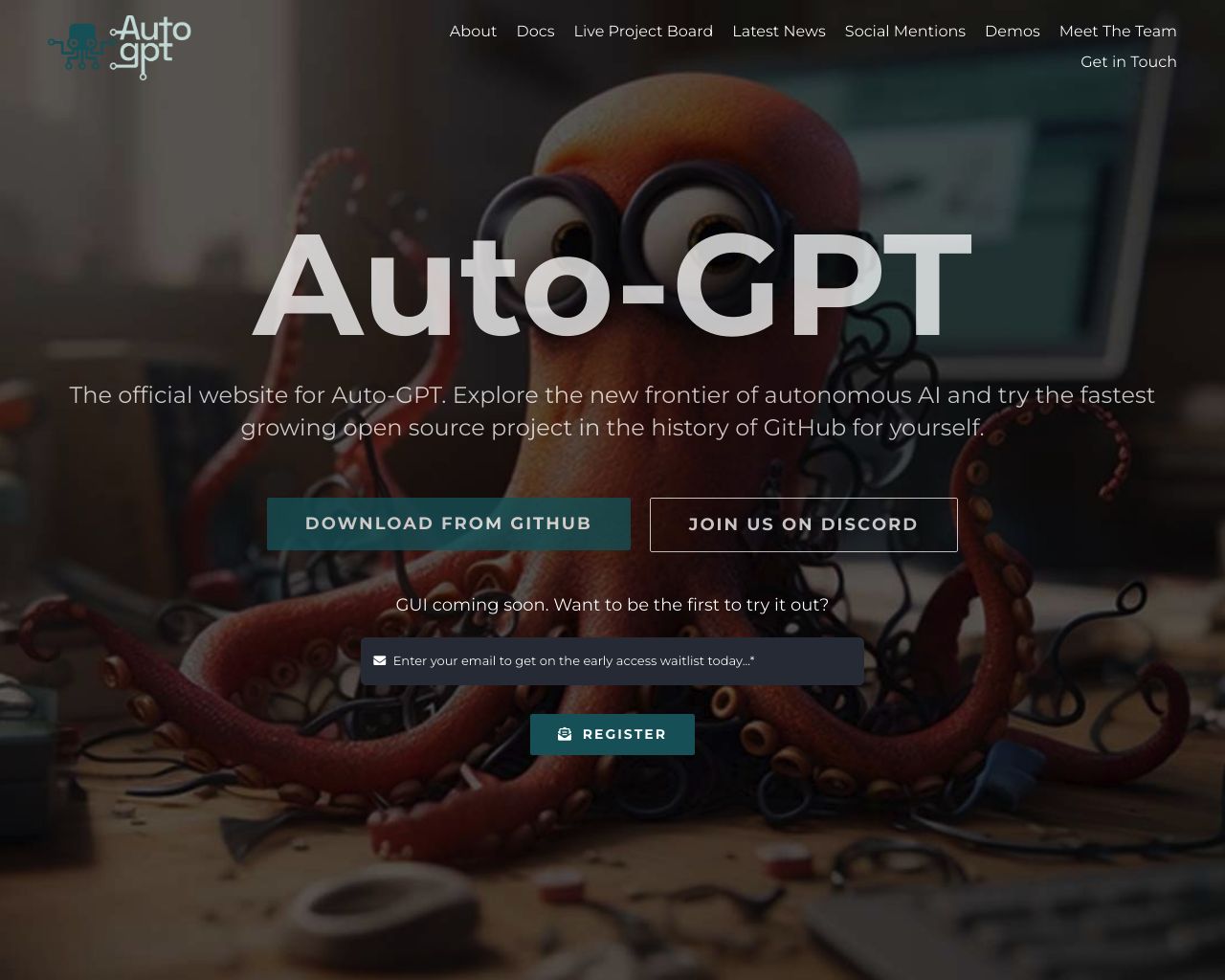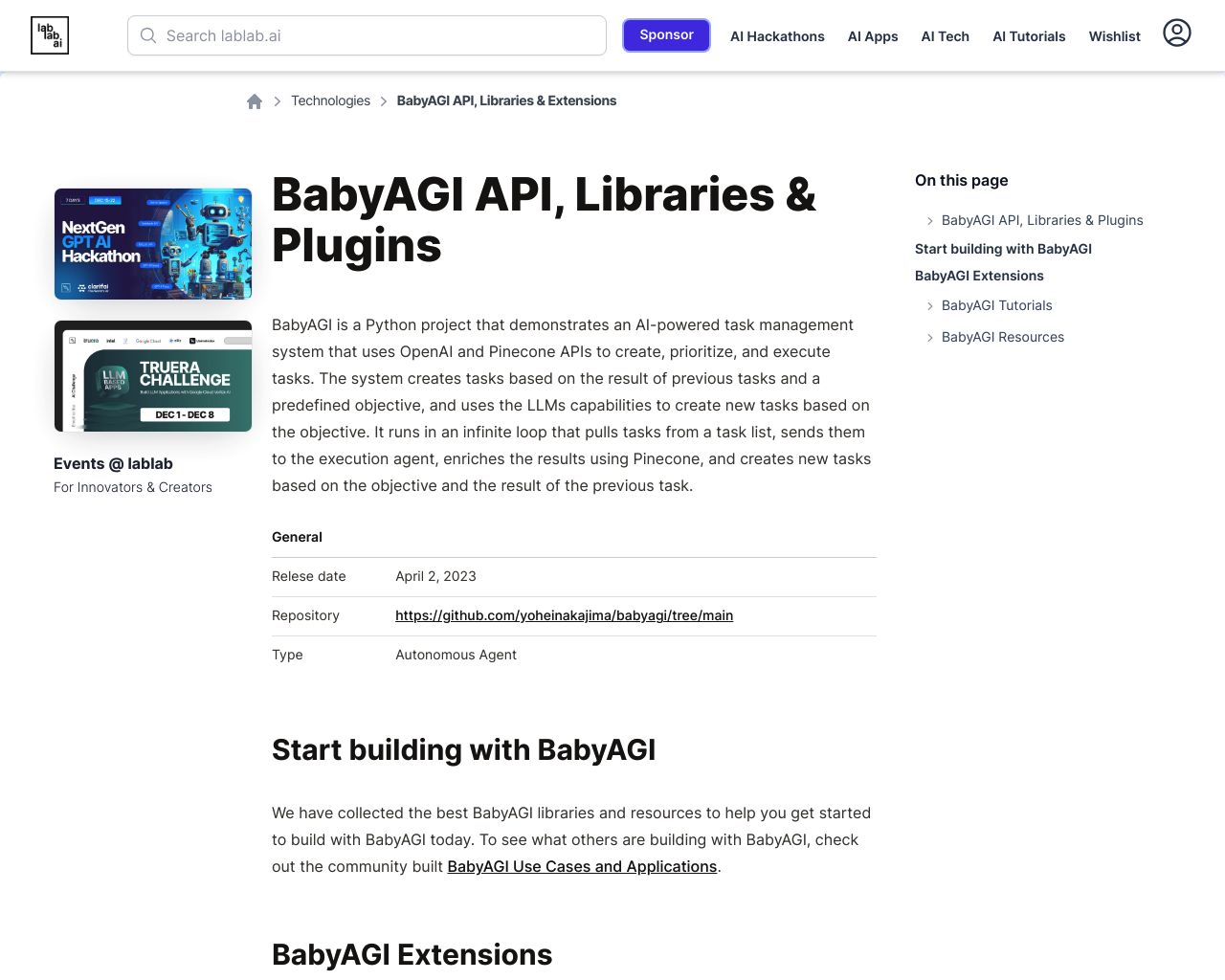Artificial intelligence (AI) agents have transformed the landscape of software development and task automation. AutoGPT and BabyAGI stand at the forefront of this revolution, each offering unique approaches to autonomous AI. This comparison delves into the capabilities, strengths, and limitations of these platforms, exploring their potential to reshape industries from software development to healthcare. We’ll examine how these tools tackle complex challenges, their ease of use for developers and non-technical users alike, and their vision for the future of AI. By the end, you’ll understand which platform might best suit your needs and how they stack up against the comprehensive capabilities of SmythOS, a cutting-edge alternative that addresses the limitations of both AutoGPT and BabyAGI.
AutoGPT Overview
AutoGPT revolutionizes AI development with its autonomous agent creation platform. Leveraging OpenAI’s GPT-4 or GPT-3.5, AutoGPT enables the construction of AI agents capable of tackling complex tasks independently. These agents excel at breaking down large projects into manageable sub-tasks, maintaining context, and adapting to new information without constant human oversight.
AutoGPT revolutionizes AI development with its autonomous agent creation platform. Leveraging OpenAI’s GPT-4 or GPT-3.5, AutoGPT enables the construction of AI agents capable of tackling complex tasks independently.
The platform’s visual builder simplifies agent creation through a drag-and-drop interface, making AI development accessible to users with varying levels of technical expertise. AutoGPT’s agents demonstrate impressive problem-solving abilities, tackling challenges from software development to content creation and market research.

AutoGPT stands out for its multimodal capabilities, processing both text and image inputs. The system supports debugging, offering tools to diagnose and resolve issues efficiently. Integration options include REST API support and OAuth authentication, enhancing flexibility for developers.
AutoGPT stands out for its multimodal capabilities, processing both text and image inputs. The system supports debugging, offering tools to diagnose and resolve issues efficiently.
While AutoGPT offers significant advantages, it faces challenges. The platform can be prone to errors from self-feedback loops and may struggle with long-term memory retention. Additionally, the recursive nature of its operations can lead to high operational costs. These limitations highlight areas for potential improvement as AutoGPT continues to evolve.
AutoGPT’s vision aligns with the pursuit of artificial general intelligence (AGI), pushing the boundaries of what autonomous AI can achieve. As an open-source project, it invites collaboration and innovation from the global tech community, fostering rapid advancement in AI agent technology.
BabyAGI Overview
BabyAGI revolutionizes task management through artificial intelligence. This open-source project simulates human-like cognitive processes, autonomously generating, prioritizing, and executing tasks. BabyAGI’s core strength lies in its ability to adapt and learn, continuously refining its approach based on previous results and new information.

Developed by Yohei Nakajima, BabyAGI leverages advanced natural language processing and vector databases to create a dynamic, self-improving system. It breaks down complex objectives into manageable subtasks, employing a task-driven approach that mimics human problem-solving strategies. This methodology enables BabyAGI to tackle a wide range of applications, from customer service to healthcare and education.
BabyAGI leverages advanced natural language processing and vector databases to create a dynamic, self-improving system. It breaks down complex objectives into manageable subtasks…
BabyAGI’s versatility shines in its ability to generate personalized solutions across various industries. In healthcare, it can analyze patient data and suggest tailored treatment plans. For education, it adapts learning experiences to individual student needs. This flexibility makes BabyAGI a valuable tool for businesses seeking to enhance productivity and efficiency through intelligent automation.
While BabyAGI offers impressive capabilities, it faces challenges in scalability and integration with existing systems. The platform lacks some advanced features found in enterprise-level solutions, such as built-in debugging tools or extensive API integrations. Additionally, the open-source nature of BabyAGI means users may need to invest time in setup and customization to fully leverage its potential.
BabyAGI represents a significant step towards artificial general intelligence, pushing the boundaries of what AI can achieve. Its focus on autonomous learning and adaptation positions it as a pioneering tool in the ongoing development of more sophisticated AI systems. As the field of AI continues to evolve, BabyAGI stands out as a platform that offers a glimpse into the future of intelligent, self-improving systems.
Feature Comparison
AutoGPT and BabyAGI represent different approaches to autonomous AI agents, each with unique strengths and limitations. AutoGPT excels in its multimodal capabilities, processing both text and image inputs to tackle diverse tasks. Its visual builder simplifies agent creation through an intuitive drag-and-drop interface, making AI development accessible to users with varying levels of technical expertise. AutoGPT also provides robust debugging tools, enabling efficient diagnosis and resolution of issues during development.
In contrast, BabyAGI focuses on simulating human-like cognitive processes for task management. It specializes in autonomous task generation, prioritization, and execution, continuously learning and adapting its approach based on previous results and new information. BabyAGI’s strength lies in its ability to break down complex objectives into manageable subtasks, employing a task-driven approach that mimics human problem-solving strategies.
Regarding core components and security, AutoGPT offers more comprehensive features. It supports OAuth authentication and REST API integration, enhancing flexibility for developers and ensuring secure access to AI agents. BabyAGI, while powerful in its task management capabilities, lacks some of the advanced integration and security features found in AutoGPT. This gap in functionality may limit BabyAGI’s applicability in enterprise environments where robust security measures and extensive API integrations are crucial.
Feature Comparison Table
| AutoGPT | BabyAGI | SmythOS | |
|---|---|---|---|
| CORE FEATURES | |||
| Hosted Agents (Dev, Production) | ❌ | ❌ | ✅ |
| Environments (Dev, Production) | ✅ | ❌ | ✅ |
| Visual Builder | ✅ | ❌ | ✅ |
| No-Code Options | ✅ | ❌ | ✅ |
| Explainability & Transparency | ❌ | ❌ | ✅ |
| Human-AI Interaction | ✅ | ❌ | ✅ |
| Audit Logs for Analytics | ❌ | ❌ | ✅ |
| Agent Work Scheduler | ❌ | ❌ | ✅ |
| Logs & Monitoring | ✅ | ❌ | ✅ |
| SECURITY | |||
| Constrained Alignment | ❌ | ❌ | ✅ |
| IP Control | ❌ | ❌ | ✅ |
| COMPONENTS | |||
| Foundation AIs | ✅ | ❌ | ✅ |
| Data Lakes | ❌ | ❌ | ✅ |
| DEPLOYMENT OPTIONS (EMBODIMENTS) | |||
| Staging Domains | ❌ | ❌ | ✅ |
| Production Domains | ❌ | ❌ | ✅ |
| Deploy as Scheduled Agent | ❌ | ❌ | ✅ |
| DATA LAKE SUPPORT | |||
| Hosted Vector Database | ❌ | ✅ | ✅ |
| Sitemap Crawler | ❌ | ❌ | ✅ |
| YouTube Transcript Crawler | ❌ | ❌ | ✅ |
Best Alternative to AutoGPT and BabyAGI
SmythOS emerges as the superior alternative to AutoGPT and BabyAGI, offering a comprehensive agentic AI automation platform that addresses the limitations of its competitors. Our platform combines ease of use, an extensive feature set, and unlimited use cases to provide a versatile solution for AI agent development and deployment.
Unlike AutoGPT and BabyAGI, SmythOS offers a true drag-and-drop visual builder, making AI agent creation accessible to users of all skill levels. This intuitive interface allows for rapid prototyping and development without sacrificing functionality. We also provide hosted agents for both development and production environments, ensuring seamless transitions from testing to live deployment.
SmythOS emerges as the superior alternative to AutoGPT and BabyAGI, offering a comprehensive agentic AI automation platform that addresses the limitations of its competitors.
SmythOS excels in its extensive integration capabilities, supporting a wide range of foundation AI models, APIs, and data sources. This flexibility allows users to leverage existing tools and systems while building powerful AI agents. Our platform also prioritizes security and compliance, offering features like constrained alignment, data encryption, and IP control that are absent in AutoGPT and BabyAGI.
Perhaps most importantly, SmythOS offers unparalleled scalability and deployment options. Users can deploy their AI agents as APIs, webhooks, scheduled tasks, or even integrate them into popular platforms like ChatGPT. This versatility, combined with our robust hosting infrastructure, ensures that SmythOS can handle enterprise-level demands while remaining accessible to individual developers and small teams.
By choosing SmythOS, users gain access to a cutting-edge AI agent builder that outperforms AutoGPT and BabyAGI in key areas such as usability, feature richness, and deployment flexibility. Our platform empowers users to create sophisticated AI solutions for a wide range of applications, from customer service automation to complex data analysis tasks, all within a single, intuitive environment.
Conclusion
AutoGPT and BabyAGI showcase impressive capabilities in autonomous AI agent technology, each with distinct strengths. AutoGPT excels in multimodal processing and provides a user-friendly visual builder, while BabyAGI shines in simulating human-like cognitive processes for task management. However, both platforms face limitations in scalability, integration, and enterprise-level features.
SmythOS emerges as the superior choice, offering a comprehensive solution that addresses the shortcomings of AutoGPT and BabyAGI. Our platform provides unparalleled versatility with its extensive integration ecosystem, supporting over 300,000 integrations and a wide range of AI models. SmythOS’s drag-and-drop interface simplifies complex AI workflows, making advanced AI functionalities accessible to users of all technical backgrounds.
Unlike its competitors, SmythOS offers robust deployment options, allowing users to deploy AI agents anywhere from chatbots to APIs. Our platform’s multi-agent orchestration capabilities, coupled with advanced security features and scalability, make it ideal for enterprise-level applications. SmythOS also provides comprehensive debugging tools, audit logs, and monitoring features, ensuring transparency and reliability in AI operations.
We invite you to experience the future of AI automation with SmythOS. Create a free account and explore our platform’s capabilities without any time limit. With our 30-day money-back guarantee, you can build AI agents risk-free and discover how SmythOS can revolutionize your workflow. For those seeking inspiration, check out our diverse range of AI-powered agent templates to jumpstart your journey into intelligent automation.